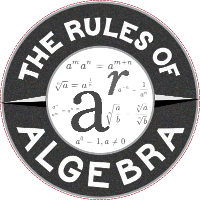Algebra Rule 18
Anything raised to the power of zero is equal to 1
This rule may seem arbitrary, but it is necessary in order to maintain consistency with other properties of exponents. Consider the rule ``a^na^m = a^{n+m}``. What happens if ``m = 0``? The right hand side of the equation will be ``a^{n+0}``, or ``a^n``. This means that in the left hand side, ``a^n`` has to be multiplied by the value of ``a^0``, but remain unchanged. The only way for this to be the case is if ``a^0 = 1``. (For some discussion of the peculiar case of ``0^0`` and why it should (probably) equal ``1``, see this article.)
